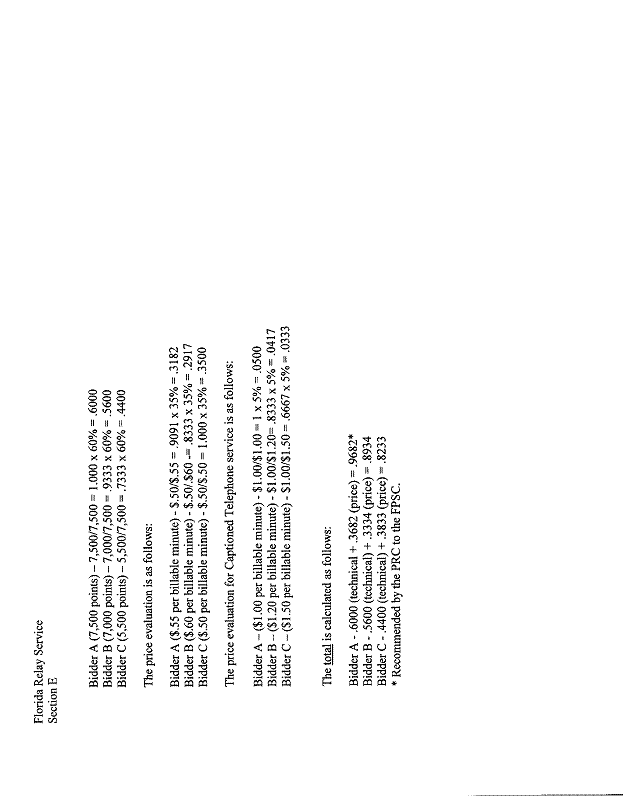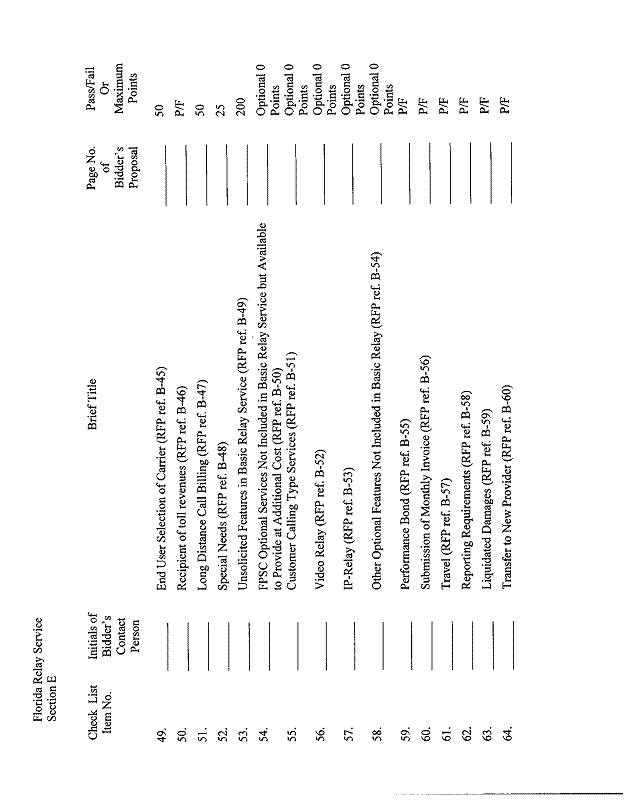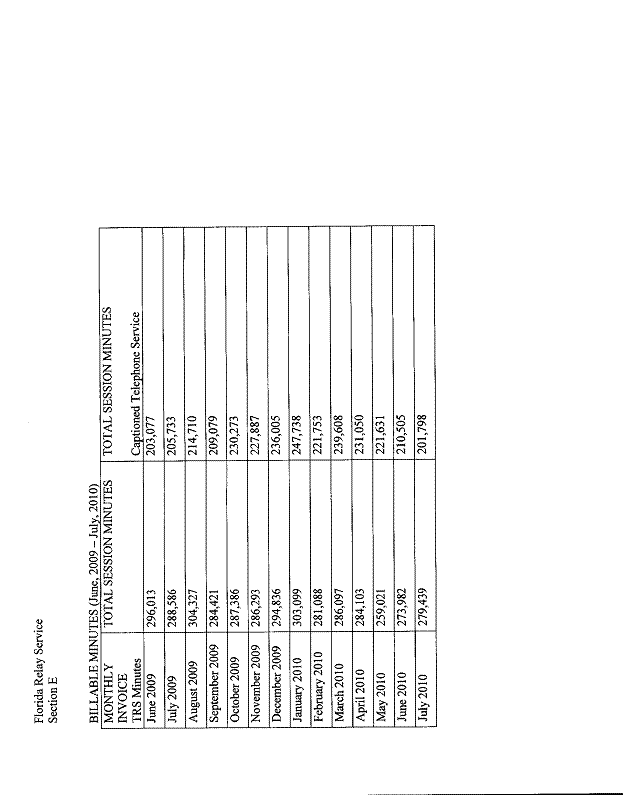
















































Changes in appearance and in display of formulas, tables, and text may have occurred during translation of this document into an electronic medium. This HTML document may not be an accurate version of the official document and should not be relied on.
For an official paper copy, contact the Florida Public Service Commission at contact@psc.state.fl.us or call (850) 413-6770. There may be a charge for the copy.
|
DATE: |
||
|
TO: |
Office of Commission Clerk (Cole) |
|
|
FROM: |
Division of Regulatory Analysis (Kennedy, Casey) Office of the General Counsel (Miller) |
|
|
RE: |
Docket No. 110013-TP – Request for submission of proposals for relay service, beginning in June 2012, for the deaf, hard of hearing, deaf/blind, or speech impaired, and other implementation matters in compliance with the Florida Telecommunications Access System Act of 1991. |
|
|
AGENDA: |
04/26/11 – Regular Agenda – Interested Persons May Participate |
|
|
COMMISSIONERS ASSIGNED: |
||
|
PREHEARING OFFICER: |
||
|
SPECIAL INSTRUCTIONS: |
||
|
FILE NAME AND LOCATION: |
S:\PSC\RAD\WP\110013.RCM.DOC |
|
This recommendation proposes that the Florida Public Service Commission (FPSC or Commission) approve the attached Request for Proposal (RFP) (Attachment A) to provide a telecommunications relay service system in Florida. If approved, the RFP will be issued no later than May 2, 2011, with the bidders' proposals due by July 6, 2011. The tentative schedule calls for the Commission to select a provider in September 2011, and for the provider to begin furnishing service by June 1, 2012.
The RFP describes a relay service which will be in compliance with both the Florida Telecommunications Access System Act (TASA) and the federal Americans with Disabilities Act (ADA). The RFP mandates many features including: 24 hour a day service every day of the year, answering time and blocking standards, confidentiality conditions, procedures for relaying a call which gives substantial control to the user over how the call is handled, communications assistant (CA) and staff requirements, provisions for complaint resolution and consumer input, and other features. In addition, the RFP allows a bidder to provide unsolicited features as part of its basic relay service for which additional evaluation points may be awarded. Bidders may also propose optional services (for which a separate price is proposed), such as Video Relay, IP-Relay, and an Account Manager, that are not part of their basic relay service, and for which additional points will not be awarded. Once a provider is selected, the FPSC will determine which of the optional services it may wish to add to the basic relay service and negotiate the conditions under which these optional services will be offered.
The FPSC shall award the contract to the bidder whose proposal is the most advantageous to the state, taking into account the following considerations in Section 427.704(3)(a), Florida Statutes:
a. The appropriateness and accessibility of the proposed telecommunications relay service for the citizens of the state, including persons with hearing and/or speech loss;
b. The overall quality of the proposed telecommunications relay system;
c. The charges for the proposed telecommunications relay service system;
d. The ability and qualifications of the bidder to provide the proposed telecommunications relay service system as outlined in the RFP;
e. Any proposed service enhancements and technological enhancements which improve service without significantly increasing cost;
f. Any proposed inclusion of provision of assistance to deaf persons with special needs to access the basic telecommunications system;
g. The ability to meet the proposed commencement date for the Florida Relay Service (FRS); and
h. All other factors listed in the RFP.
Each bidder will be required to submit its bid on the basis of a charge per billable minute assuming a three-year contract would be awarded with the option of four one year extensions. The price proposal must be submitted in a sealed envelope separate from the technical proposal.
The RFP also provides for a point system for evaluating the proposals. A weight of 60% will be given to the technical aspect of the proposal and a weight of 40% will be given to the price aspect of the proposal.
Case Background
The Telecommunications Access System Act of 1991 (TASA) became effective May 24, 1991, and is found in Chapter 427, Part II of the Florida Statutes. TASA was developed in response to two needs. The first was the need for permanent funding for the distribution of specialized telecommunications equipment for people with hearing and/or speech loss (TDDs, volume control telephones, etc.). The second motivation for TASA was the need for a telecommunications relay system whereby the cost for access to statewide basic telecommunications services for persons who have a hearing loss or speech impairment is no greater than the amount paid by other telecommunications customers.
The ADA required telephone companies to develop a relay system for both interstate and intrastate calls by July 1993; however, TASA mandated that a statewide telecommunications relay service be provided earlier, beginning June 1, 1992. Florida's TASA required the development of a statewide relay service that would be capable of being certified by the FCC. TASA provides funding for the distribution of specialized telecommunications devices and intrastate relay service through the imposition of a surcharge of up to $.25 per landline access line per month. (Accounts with over 25 lines are billed for only 25 lines).
There are several entities identified in TASA. The FPSC has overall responsibility for implementation and oversight of the system. The incumbent local exchange companies (LEC), competitive local exchange companies, and shared tenant providers have the responsibility of collecting the surcharge and submitting it to the Administrator. Florida Telecommunications Relay, Inc. (FTRI), a nonprofit corporation formed by the LECs, was named by the FPSC to serve as the TASA administrator. The provider is the entity that, as a result of being awarded the contract resulting from the RFP, will provide relay service.
The Advisory Committee (AC) is a group of up to ten individuals recommended by various organizations representing both the telephone industry and individuals that are deaf, hard of hearing, and speech or dual sensory impaired. The Advisory Committee's role is to provide input to both the FPSC and the FTRI on the development and operation of the relay system. Staff met with the AC on November 19, 2010, to obtain its input. Two AC members assisted staff since that meeting and their suggested changes are in the attached draft RFP.
The current contract with Sprint expires May 31, 2012. Thus, the RFP needs to be approved for issuance so that we can remain on schedule and a contract can be signed in September 2011, allowing the selected provider time to set up the system by June 1, 2012.
Issue 1:
Should the Request for Proposal be issued?
Recommendation:
Yes. The Commission should issue the Request for Proposal, as set forth in Attachment A. (Kennedy, Casey, Miller)
Staff Analysis:
The RFP was drafted to describe as specifically as possible the relay service that should be provided. The RFP includes services currently being provided and is compliant with all the Federal Communications Commission (FCC) certification requirements. The RFP also includes the Advisory Committee's recommendations.
The proposed RFP language reflects all of the specifications and service requirements that are currently under contract. Accordingly, staff recommends that the Commission should issue the Request for Proposal, as set forth in Attachment A.
Issue 2:
Should this docket be closed?
Recommendation:
Staff Analysis:
Rather than an FPSC order being issued on this contractual matter, the RFP will be issued pursuant to Section 120.57(3), Florida Statutes. This docket should remain open throughout the life of the contract with the provider selected to begin providing service on June 1, 2012.
















































